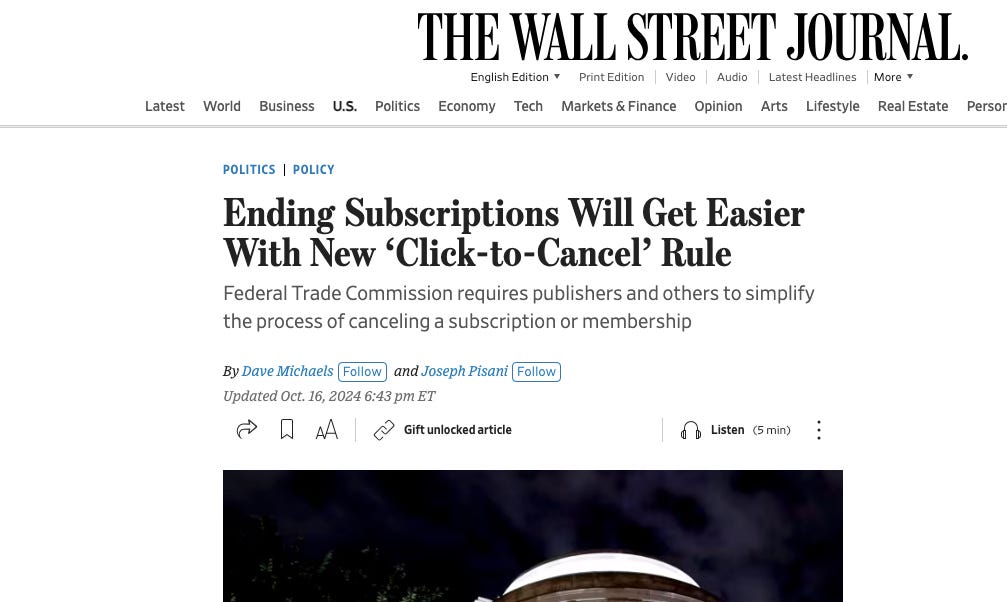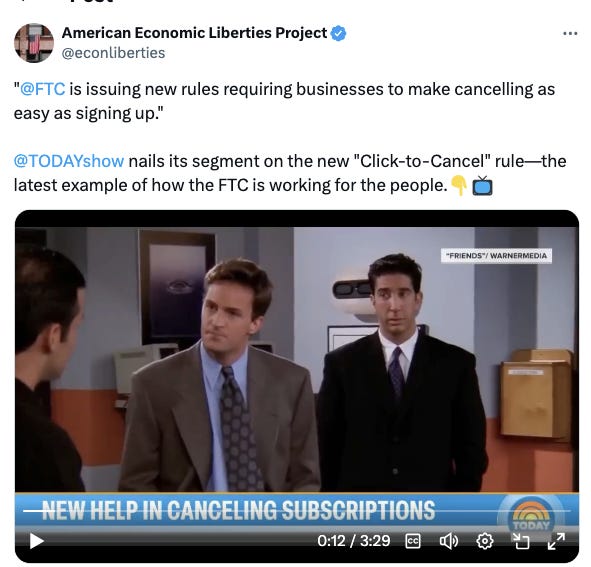Fitness
Lina Khan vs Planet Fitness

On Wednesday, the Federal Trade Commission put out a regulation to make it easier to cancel subscriptions, what is called the “Click to Cancel” rule. In this piece, I’ll go over the rule, why it matters, but also, the quiet and nasty campaign against it. Because while it would seem obvious that companies like Planet Fitness, the notorious gym franchisor that allegedly scams customers by making it excruciatingly difficult to cancel a membership, shouldn’t be able to do what they do, there is a reason they can.
Let’s start with the regulation itself, what in the industry is called “The Negative Option Rule.” It’s actually really simple, and just says that it should be as easy to cancel a subscription as it was to sign up for it. There are some additional elements, like firms have to tell consumers they are subscribing to something, no deception on important information, and customers have to agree to pay before corporations can bill them. Basically, just don’t act like Planet Fitness.
Unlike most of the laws and rules around political economy that affect our lives, the FTC’s Click to Cancel rule got wide coverage, because it’s something that is so relatable. Both President Biden and VP Harris tweeted it out, as did many many politicians. It was front-page news on the Wall Street Journal and across the media; the Today Show did a segment, digging up an old Friends episode, where Chandler Bing tries to cancel a gym membership, to explain the policy.
Social media, of course, exploded, with mockery of Adobe, Amazon Prime, Planet Fitness, and other obnoxious firms that make it hard to unsubscribe.
Why does this rule, which is supposed to go into effect in six months, matter? Well, it’s because “the subscription economy” has exploded in recent years, at almost a trillion dollars in value. For instance, Microsoft, one of the biggest companies in the world, is now a subscription business, with 77 million subscribers to its Office suite and tens of millions of Game Pass subscribers. Hollywood has moved to a subscription streaming model, as have dozens of industries. The term “software as a Service” (SaaS) is used so often it’s a joke.
The reason is simple; recurring revenue is great, it lets businesses plan and have mostly guaranteed customers, and it lets customers get stuff they want without having to think about it. Corporations are building subscriptions around everything they can, from streaming services to software to kitty litter, pet food, gyms, car washes, printer paper, pet toys, coffee, diapers, and even Taco Bell. But there is an obvious downside we all understand to subscriptions. Most of us just forget about subscriptions and pay money we ordinarily wouldn’t. And sometimes, unethical businesses trap customers and get revenue they otherwise shouldn’t. And the latter is what the FTC is tackling.
While the growing size of the subscription economy is new, the problem of unethical recurring charges is not. Congress, over the years, has passed many laws to address it directly, such as the Restore Online Shoppers’ Confidence Act, the Unordered Merchandise Statute, and the Electronic Fund Transfer Act, though such corrupt acts are also barred under a broader law prohibiting false and deceptive practices the FTC has used since the 1970s on subscriptions. And that’s the legal tool the FTC is using in crafting this particular rule, not antitrust, but its consumer protection lever.
In order to put out such a rule, the FTC has to show that deception is common, and tailor the rule towards that deception. One of the ways showing it’s common is if the FTC has issued cease and desist orders relevant to the infraction, and the FTC has indeed brought 35+ on forms of deception in subscription renewal. At this point, cheating people through subscriptions is pervasive. In 2019, one study showed that “59% of consumers have been signed up “against their will” for “free trials” that “automatically converted into a recurring payment,” with a similar number found by the Washington Attorney General’s office. The FTC gets tens of thousands of complaints every year on this, as does the Better Business Bureau and marketers in general.
Finding out you’ve subscribed to something without your permission is extremely annoying, it’s far worse when the consumer has dementia, or just doesn’t pay much attention. And it’s also profitable. There’s not a huge amount of economic literature on trapping people with subscriptions, but several economists found an interesting natural experiment where they examined what happened to subscriptions when credit or debit cards got replaced. Normally subscriptions automatically recur, unless a consumer is paying attention. But when a card got replaced, a consumers had to actively resubscribe to services they want, since everything was automatically canceled. What these economists found is that people forgetting about or being unable to cancel subscriptions generates a lot of money, raising “seller revenues by between 14% and more than 200%.”
Many big businesses will lose money if this rule goes through. Aside from calling for Lina Khan to be fired from the FTC, what’s their strategy to push back? What, effectively, is the Planet Fitness lobby doing?
For most of our history, Washington, D.C. has been a podunk town, out of the way, and not particularly wealthy, especially compared to financial centers like New York and Chicago.
But today, five out of the top ten wealthiest counties in America are in the Washington, D.C. suburbs, with billionaires like Jeff Bezos buying mansions in the Capitol which he throws parties, and purchasing the local newspaper. The reason for the riches is proximity to a large and flaccid government; lawyers who manipulate this system get paid a lot of money to make sure that the vast transfer of wealth happening from you and me to Planet Fitness-style actors continues. And what do they actually do?
Well, one very common lucrative activity is to write comments to agencies and courts about why their clients should be able to go unregulated, often using rhetoric that is both overheated and boring. And that’s what they are doing with the Click to Cancel rule. These remarks are buried in comment dockets, public document troves that few members of the public ever see.
“The International Franchise Association,” wrote one lobbyist in the FTC comment docket, “is troubled by the Commission’s policymaking process that applies broad-brush regulation not rooted in rigorous data collection and empirical analysis.” Why might the IFA be troubled? Well the IFA represents franchisors, and yes, Planet Fitness, with 18 million members, is an IFA member. In fact, a former Chair of the IFA, David Humphrey, is a Planet Fitness executive who has worked with private equity in the franchise space.
I read a bunch of these comments, from the Service Contract Industry Council to the Interactive Advertising Bureau (the lobby shop for Google and Facebook), the Electronic Transaction Association (a lobby shop for Visa, Amazon, American Express, Google, et al), the Retail Industry Leaders Association, the Entertainment Software Association, Digital Media Association, and Motion Picture Association, Technet, et al. The Click to Cancel rule was, for all these lobbyists, uniformly bad. Being able to easily cancel subscriptions could screw up video games by “interfering with game play and customer enjoyment,” it could “stifle future innovation” in retail and undermine consumer “peace of mind” in service contracts.
And just to give you one more illustration of the kind of person making your life more of a hassle, take this lobbyist-lawyer on the verge of retirement, a guy named Tom Power, the general counsel of a trade association of big wireless companies, CTIA. Power’s career is fairly standard for D.C. He worked in the Clinton and Obama administrations in various bureaucratic positions in telecommunications, one of the endless numbers of New Democrats who helped structure modern communications, moving in and out of lobbying positions for telecom firms. Here’s Power:
In CTIA’s comment, Power explained why the FTC’s rule is bad. He makes some legitimate points, like if you cancel your cell phone service, a telecom company shouldn’t be penalized for telling you that you should port your phone number to a new one. But mostly, the comment is about how a mobile operator should be able to hassle customers who want to cancel service. Without telecom firms being able to hassle customers, he writes, they will miss out on ”vital consumer education.”
The real meat for these comments, however, is the procedural stuff. Are deceptive practices sufficiently “prevalent” for the FTC to put out a rule? Did the FTC provide adequate grounds for comment? Is the rule specific enough, or is it too broad? Always the argument is that the regulator made a process foul. Because it’s much easier to process troll a regulator than to address the substance of a popular and needed rule.
So those are the lobbyists. But do they really have power? Can’t these comments be ignored? To answer that, we have to look at the vote on the FTC for this rule, which was actually close. The FTC is actually a commission with five members, and they need a majority to pass a regulation. In multi-member commissions, usually the current administration party has three members, and the minority party gets two members.
In the Click to Cancel vote, the three Democrats, Lina Khan, Rebecca Kelly-Slaughter, and Alvaro Bedoya, supported the rule. The two Republicans, however, Melissa Holyoak and Andrew Ferguson, did not. So it passed by a 3-2 margin, which is a signal to conservative judges that they should be skeptical of this rule. Holyoak, who is well-known to support U.S. Chamber-style policies, wrote a long dissent explaining her thinking.
It’s a fairly vicious dissent. Updating this rule was first put proposed in 2019, a policy statement was adopted in 2021, and the proposed rule was put out for comment in 2023. It’s been a five year process to finalize the rule. Holyoak, however, claims that the rule is being rushed to be timed with the Presidential contest, that it’s “blatant electioneering” and a “new low in our abuse and misuse” of FTC authority. She writes with frustration that FTC rules usually take five and a half years. “That, apparently, was too much time and procedure for the Majority,” and that she only had a few weeks to review the final one. “Here,” she writes, “the time period for me to review this economy-wide rule was a matter of weeks.”
Holyoak could have claimed credit for Republicans for this popular proposal, since the initial questions happened under Trump. But instead, she went full partisan and anti-populist, and adopted the position of the big business friendly U.S. Chamber of Commerce.
There’s also lots of process stuff. It’s too broad, it’s not broad enough. The FTC didn’t explicitly say what they were going to do early enough, thus there wasn’t enough time to comment. Etc etc, mostly repeating what the various trade association lobbyists said. The idea is to leave a breadcrumb trail for the courts. If it goes in front of the right judge, then the regulation becomes “arbitrary and capricious” on process, and judges can use this to strike down these rules without taking on an unpopular policy position.
Now, let’s not overstate the possibility of this rule being struck down. While the non-compete rule was set aside by a Texas judge, the authority the FTC used in that case was different, and was under sustained attack for years. In this case, no one disputes that the FTC has the authority to promulgate rules around unfair and deceptive practices, it’s done it for decades, and Congress explicitly authorized doing so. But I did want to lay out the plan from the Planet Fitness/U.S. Chamber of Commerce types.
The Click to Cancel rule is wildly popular, legally sound, and obvious. What lobbyists in D.C. are trying to do is process troll it to death. As we move to a more and more subscription-based economic order, these kinds of regulations will dictate just how much liberty we as Americans have. If more policymakers and elected officials think and act like Khan, Bedoya, and Slaughter, then we’ll be fine. But if not, and we continue to get ripped off, we at least deserve to know why a nation as powerful as America can’t even bring Planet Fitness to heel.
Thanks for reading. Send me tips on weird monopolies, stories I’ve missed, or comments by clicking on the title of this newsletter. And if you liked this issue of BIG, you can sign up here for more issues of BIG, a newsletter on how to restore fair commerce, innovation and democracy. If you really liked it, read my book, Goliath: The 100-Year War Between Monopoly Power and Democracy.
cheers,
Matt Stoller













